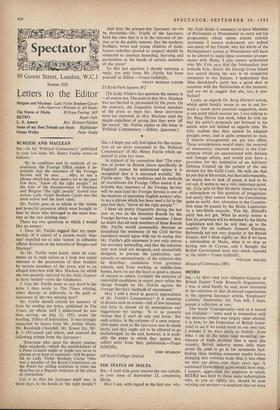SIR,--I hope you will find space for the correc- tion
of an error contained in the 'Political Commentary' of Mr. Henry Fairlie which ap- peared in your last issue.
In support of his contention that 'The exer- cise of power in Britain (more specifically in England) cannot be understood unless it is recognised that it is exercised socially,' Mr. Fairlie says : 'By its traditions and its methods of recruitment the Foreign Office makes it in- evitable that members of the Foreign Service will be men (and the Foreign Service is one of the bastions of masculine English society) who, to use a phrase which has been used a lot in the past few days, "know all the right people."' I have sat pretty frequently during the last year or, two on the Selection Boards for the Foreign Service as an 'outside' member. I have no doubt that all such members of these Boards (Mr. Fairlie would presumably discount • as prejudiced the testimony of the Civil Service members) would agree with me in saying that Mr. Fairlie's glib statement is not only untrue but seriously misleading, and that the selection tests now used are designed, and successfully designed, to prevent the application, con- sciously or unconsciously, of the criterion that he describes: candidates from grammar schools, and from working or middle-class homes, have (to say the least) as good a chance of success as others. Certainly the statistics of successful candidates in recent years refute the charge brought by Mr. Fairlie against the Foreign Service's 'methods of recruitment.'
May I add a word in general appreciation of Mr. Fairlie's Commentary? It is tempting to dismiss such an article—full of low innuendo and false in almost all its assumptions and suggestions—by saying: 'It is so patently vicious that it can't do any real harm.' But such articles, in the columns of a once respon- sible paper such as the Spectator, can do much harm, and they ought not to be allowed to go unchallenged. In the end, however, it is prob- ably the paper in which they appear that suffers most from their publication.—Yours faithfully, JOHN SPARROW
All Souls College, Oxford


































 Previous page
Previous page